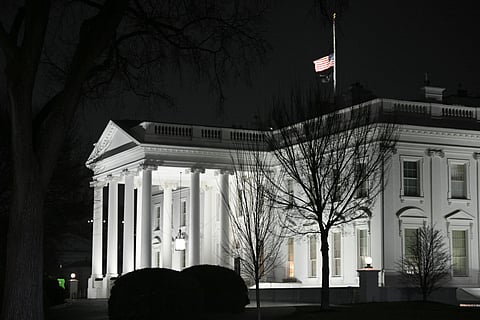
- NEWS
- the EDIT
- COMMENTARY
- BUSINESS
- LIFE
- SHOW
- ACTION
- GLOBAL GOALS
- SNAPS
- DYARYO TIRADA
- MORE

Jimmy Carter, the former US president and Nobel peace laureate who rose from being a peanut farmer in rural Georgia to lead the nation from 1977 to 1981, has died at the age of 100, his non-profit foundation said Sunday.
Carter had been in hospice care since February 2023 at his home in Plains, Georgia — the small town where he was born and once ran a peanut farm before becoming governor of the Peach State and running for the White House.
Carter died “peacefully surrounded by his family,” the Carter Center said in a statement.
“My father was a hero, not only to me but to everyone who believes in peace, human rights and unselfish love,” Chip Carter said in the statement.
Meanwhile, President Ferdinand “Bongbong” Marcos Jr. paid tribute to the former US president, describing him as “humanitarian who practiced what he preached: Houses for the homeless and human rights for the oppressed.”
He praised Carter’s commitment to peace in war-torn regions and prosperity in societies marked by poverty, guided by his faith and servant leadership.
Marcos highlighted Carter’s advocacy for universal values, embraced by Filipinos, which laid the foundation for a better and kinder society. “He was a model of the power to do good, driven not by politics or personal gain, but by pure love for others,” Marcos said.
Carter was the longest-lived US president — an outcome that seemed unlikely back in 2015 when the Southern Democrat revealed he had brain cancer.
But the US Navy veteran and fervent Christian repeatedly defied the odds to enjoy a long and fruitful post-presidency, after four years in the Oval Office often seen as disappointing.
During his single term, Carter made a commitment to human rights and social justice, enjoying a strong first two years that included brokering a peace deal between Israel and Egypt dubbed the Camp David Accords.
But his administration hit numerous snags — the most serious being the taking of 52 US hostages in Iran and the disastrous failed attempt to rescue them in 1980. He also came in for criticism for his handling of the oil crisis.
Republican challenger Ronald Reagan clobbered Carter at the polls in November of that year, relegating the Democrat to just one term. Reagan, a former actor and governor of California, swept into office on a wave of staunch conservatism.
Active post-presidency
As the years passed, a more nuanced image of Carter emerged — one that took into account his significant post-presidential activities.
He founded the Carter Center in 1982 to pursue his vision of world diplomacy, and he was the recipient of the 2002 Nobel Peace Prize for his tireless efforts at promoting social and economic justice.
He observed numerous elections around the world and emerged as a prominent international mediator, tackling global problems from North Korea to Bosnia.
Leader, statesman, humanitarian
He and Rosalynn also became envoys for Habitat for Humanity, building homes for the poor in different countries around the world.
Carter, known for his toothy smile, said basic Christian tenets such as justice and love served as the bedrock of his presidency. He taught Sunday school at Maranatha Baptist, his church in Plains, well into his 90s.
Outside the White House, where the flag was lowered to half-staff, tourist Yoni Neirman remembered Carter, for whom she voted, as “a real statesman, and that kind of person doesn’t seem to exist, at least not in the near future.”
In Georgia, retiree Dorner Carmichael expressed the same sentiment.
“Every time you lose a person of such integrity, who spent his life in service, you just wonder who will fill his shoes,” the 75-year-old told AFP.
As condolences came in, many focused on Carter’s character, with President Joe Biden, in televised remarks, saying he “lived a life measured not by words, but by his deeds.”
“The rest of the world looks to us... and he was worth looking to,” Biden added.
Biden declared 9 January as a national day of mourning, calling on Americans to visit their places of worship to “pay homage” to Carter and inviting “the people of the world who share our grief to join us in this solemn observance.”
White House leaders past and future joined the President in issuing remembrances, with Bill Clinton saying in a statement that Carter “worked tirelessly for a better, fairer world.”
George W. Bush said Carter’s legacy would “inspire Americans for generations,” while Barack Obama said the former leader “taught all of us what it means to live a life of grace, dignity, justice and service.”
Donald Trump said Americans owed the Democrat “a debt of gratitude,” adding in a second social media post that “I strongly disagreed with him philosophically and politically.”
One of Carter’s defining foreign policy achievements — negotiating the return of the Panama Canal to Panama — has come back into focus as Trump has threatened to retake the channel.
Egyptian leader Abdel Fattah al-Sisi hailed Carter on Sunday as “a symbol of humanitarian efforts” for his role in brokering the 1978 Camp David Accords, predicting his work would “remain etched in the annals of history.”
